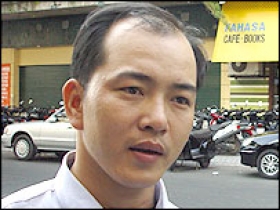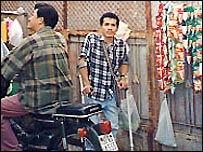
On that day, at 0115, he was born in Gia Dinh Hospital, Saigon.
Just 10 hours later, the city was taken by the northern army, and the Vietnam war was brought to its end.
"Perhaps my birth was a signal of something very special," he joked.
What happened that day was certainly special enough for his parents to decide on a different name for him from the one they had already chosen.
Nguyen Hoa Binh
"I don't think of the war... What I care most about at the moment is my job, my career"
"My parents had already picked the name Thanh [successful] for me as I was their first child and a boy. But the war ended soon after I was born so they changed the name into Hoa Binh, which means peace".
Hoa Binh now works as a reporter for the Vietnam Investment Review in Ho Chi Minh City, where his family has lived for two generations. He has his own small family - a wife and daughter.
Binh admitted he neither knew not cared much about the war.
"It was so long ago - I know it is an unfortunate thing, an evil thing. Nobody needs a war," he said.
"But I don't think of the war. Maybe once a year when my birthday is coming up and the papers start writing about it.
"What I care most about at the moment is my job, my career. If I am good at what I'm doing, I will be able to earn a good living, to make my family happy and to contribute more to society," he said.
Different preoccupations
At a gathering of representatives of the "30 April 1975 generation", who are to meet in Ho Chi Minh City for a joint birthday, it was evident that war was the last thing on their minds.
They talked business, love, music, cars, fashion - just like everyone else of that age anywhere in the world. But the word "war" hardly popped up in their conversations.
Tran Cac Hung Dzung, a medical doctor, said his favourite word was "opportunity". Although his name, another remnant of wartime, means brave or formidable, Dzung said he wished Vietnam could be peaceful forever so that the Vietnamese could have better opportunities in life.
"I would like to develop as a professional. Maybe get a scholarship to go somewhere to study," he said.
He was happy to be invited to the joint birthday party, organised by the city government for about 2,000 young people who were born in Saigon that day, but not because of its political significance.
"It just sounds like a fun thing to do. Moreover, I have nothing to do that day!"
While 30 April is more of a bank holiday than a commemoration day for many of the 30-somethings in Vietnam today, it still brings back painful memories to many others.
Operation Babylift
Peter Hoa Stone, an Australian Vietnamese, was eight years old when the war ended.

Hoa Stone is getting to know his homeland again
He was raised at an orphanage in Go Vap district of Saigon and never knew his parents. He is still not sure whether they were killed during the war.
"We knew the war was going on. Sometimes you could hear the bombs exploding during the night; most of the time you could see the American choppers flying overhead," he said.
He was one of thousands of other children who were taken to Australia under the auspices of the Australian government between 1963 and 1975 to escape the war. The programme was known as Operation Babylift.
Hoa himself was taken to Australia towards the end of the war, when he was seven or eight.
"They first brought us to Adelaide, and there we were waiting to be adopted. I was one of those older kids who had a serious disability - my legs were affected by polio and I couldn't walk. So for many years, nobody wanted to adopt me."
Hoa was eventually adopted by a couple whom he says were very good to him but whom he admits had a hard time raising him - a Vietnamese orphan with a lot of emotional baggage.
"They didn't understand me, they didn't understand I was having all these unanswered questions about my past, my parents, even my illness.
"It was a very traumatic time for me".
Eventually Hoa learned how to walk with crutches. He went to school but dropped out as a teenager after he started taking drugs and alcohol in order to 'forget his desperation.'
"I spent six years in that deep hole of problems. I was so close to committing suicide," he said.
But when he was 21 he became religious and managed to overcome his addiction.
Now back in Saigon, Hoa runs a charity organisation for orphans. He has also begun learning Vietnamese, and has never really stopped looking for his real parents.
"I still have that hope, that one day I will find them. That one day after all the war and turmoil I will finally know my roots," he said.
BBC news






